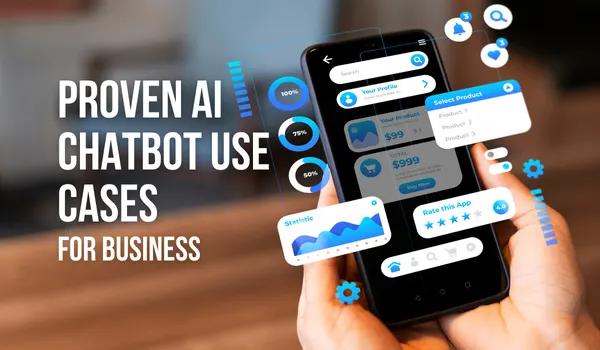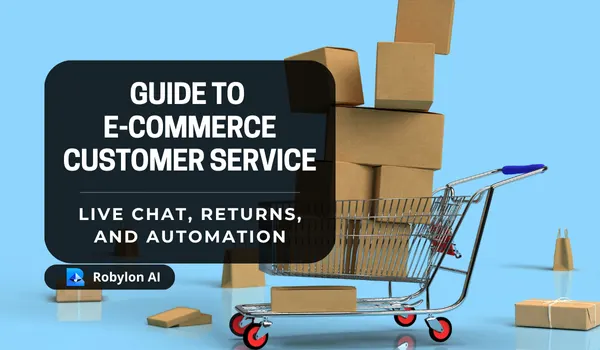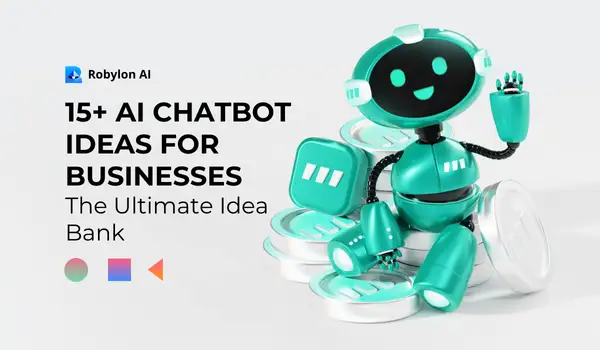TL;DR
Best AI agents for retail are reshaping customer service, sales, and store operations. This guide compares 12 best AI agents for retail in 2026, like; Robylon AI, Intercom Fin, Gorgias AI Agent, Zowie, Ada, Zendesk AI, Freshdesk (Freddy AI), Kustomer AI Agents, LivePerson, Cognigy, Kore.ai (SmartAssist / RetailAssist), and Salesforce Agentforce for Retail.
It shows where they deliver value today: order tracking (“Where is my order”), returns and exchanges, guided product discovery, and voice support. It also explains how these agents connect to your order, stock, and customer systems so they can take real actions.
Introduction
Retail teams are evolving beyond basic bots to agentic AI solutions that understand customer intent, access data, and perform tasks across multiple channels. This 2026 buyer’s guide highlights the 12 best AI agents for retail, focusing on solutions that deliver real value for order tracking, returns automation, and guided selling. Use this guide to evaluate the top tools for improving customer experience, boosting sales, and optimizing retail operations.
- Robylon AI - No-code voice + chat support for WISMO, returns, refunds
- Intercom Fin - Chat-first agent; Fin Tasks/Data Connectors for order edits
- Gorgias AI Agent - Shopify-native; AfterShip tracking and returns automation
- Zowie - Automation-heavy CX; Reasoning + Decision Engine
- Ada - Enterprise, multilingual autonomous resolution
- Zendesk AI - AI agents + Copilot inside Zendesk Suite
- Freshdesk (Freddy AI) - Value option with Shopify actions/collab
- Kustomer AI Agents - Unified CRM + automation, including native voice
- LivePerson Conversational Cloud - Enterprise conversational commerce/service
- Cognigy - Chat + voice with enterprise orchestration and guardrails
- Kore.ai (SmartAssist / RetailAssist) - CCaaS-grade accelerators, marketplace SKUs
- Salesforce Agentforce for Retail - Native skills on Customer 360
Book a demo to deploy your AI agents now
What Counts as an “AI Agent” in Retail?
An AI agent for retail is a digital assistant that comprehends a shopper’s goal, retrieves the necessary data (orders, inventory, loyalty), and performs actionable tasks such as order tracking, returns automation, and guided product discovery across multiple channels. Unlike simple chatbots, these agents can handle complex interactions, including personalized product recommendations, without human intervention.
In a single conversation, the retail AI agents can verify identity, fetch an order, change the delivery slot, trigger a refund or exchange, and send a confirmed update, end-to-end. Unlike scripted bots, modern AI agents combine Voice and Chat with secure tool use (APIs to OMS, WMS, POS, CRM) and guardrails so every step stays on-policy.
In 2026, truly agentic AI in retail means the assistant can plan and execute multi-step flows without hand-holding, for example: find order → confirm identity → reschedule delivery → send confirmation. The same orchestration powers guided product discovery, store pickup coordination, and returns with label generation.
What makes it an “agent” (not just a chatbot)
- Understands intent and context: Shopper profile, order history, store stock, and policy.
- Acts across systems: Creates/updates tickets, orders, returns, appointments, and payment links.
- Handles channels together: Web chat, SMS, WhatsApp/Instagram, email, and voice with clean handoff.
- Stays compliant: Guardrails for PII, consent, audit trails, and on-policy responses.
- Improves over time: Learns from outcomes to raise first-contact resolution and lower effort.
If your solution cannot both understand and do reliably, across channels and systems, it is a chatbot, not an agent. The platforms that meet this bar are what we call retail AI platforms.
Curious how AI agents are driving success in retail? Check out Robylon’s customer stories to see real-world examples of how businesses have transformed their operations with AI
Methodology - How This Buyer’s Guide Was Built
This guide ranks the best AI agents for retail in 2026 by rating them on parameters from coverage of use cases to ease of use. We focused on production-ready tools that can both understand intent and take action across retail systems.
1. Scope & inclusion criteria
- Products must support at least two modalities (chat and/or voice AI for retail) and execute actions via APIs or native connectors.
- Clear retail coverage (ecommerce or omnichannel) with documented flows for WISMO, returns/exchanges, and guided selling.
- Public documentation or hands-on access sufficient to validate capabilities, pricing model, and deployment patterns.
2. Evaluation pillars
- Customer Service: WISMO, self-service support, returns automation, escalation quality.
- Shopping & Conversion: Conversational commerce, guided selling AI, personalization, and promotions.
- Store & Merchandising Operations: Inventory visibility, pricing/promo workflows, store analytics.
3. Features
- Channel coverage (Chat, Voice AI, WhatsApp/Instagram, email).
- Tool connectivity (OMS, WMS, POS, CRM) and reliability of actions.
- Governance (policy guardrails, PII controls, audit).
- Analytics (resolution/containment, AHT, CSAT, conversion).
- Time-to-Value (days to first automated resolution, effort to reach 80% coverage of target intents).
4. Pricing & ROI normalization
We compared AI agent pricing by converting vendor models (per-minute voice, per-message chat, platform usage) into
- Cost per 100 voice minutes and Cost per 1,000 chat messages
- Cost per automated resolution, using standard retail contact mix.
5. Data sources & review cadence
- Vendor documents, product sandboxes/demos, marketplace listings, and publicly stated feature roadmaps.
- Hands-on flow tests for WISMO/returns/guided selling, where access is allowed.
- Quarterly refresh; interim updates for major releases affecting top retail AI platforms.
Top 12 AI Agents for Retail in 2026(Compared)
12 Best AI Agents for Retail
The top AI agents for the retail industry include
1. Robylon: No-code voice & chat agents for support
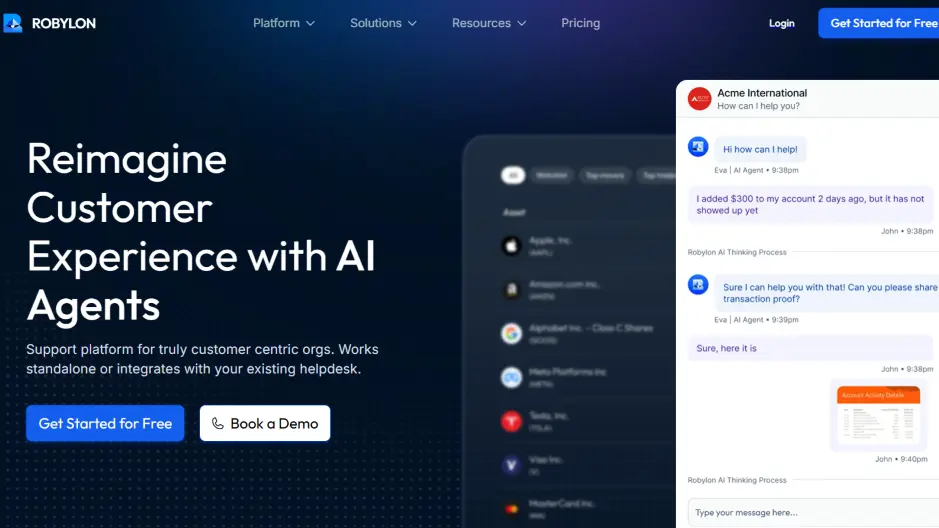
Robylon builds autonomous AI agents that seamlessly integrate with your retail ecosystem to automate key customer service functions. With no-code voice and chat capabilities, Robylon AI handles WISMO (Where Is My Order), returns, refunds, and product discovery. These agents operate across various channels, including Tickets, Chats, Voice, WhatsApp, and other messaging platforms.
By leveraging human-in-the-loop controls, Robylon ensures that any complex or sensitive interaction is escalated to a human agent when necessary, allowing for a hybrid model that blends AI efficiency with human empathy. This makes it a perfect solution for retailers looking to improve both operational efficiency and customer satisfaction.
Key Use Cases for Robylon
- Reactivation Campaigns: Robylon’s AI agents are designed to drive customer re-engagement by automating personalized Reactivation campaigns. Through intelligent communication, Robylon helps retailers increase conversion rates by reactivating dormant users and nudging them toward completing their purchase, tracking orders, or returning to your platform.
- Drop-off Journeys: For customers who abandon their shopping cart, Robylon can automatically initiate drop-off recovery journeys. By identifying customers who have added products to their cart but did not complete the checkout process, the AI can send timely reminders and offer incentives such as discounts or personalized product recommendations.
- Customer Support Automation: Robylon AI enhances customer support by handling a variety of common queries, including order tracking, refund requests, and product inquiries. By automating these interactions, Robylon reduces the workload for customer service teams and provides immediate, 24/7 support to customers. Its ability to handle both voice and chat ensures omnichannel support that can meet customers wherever they engage.
Best for: E-commerce and logistics teams that need a hassle-free, no-code solution for quick deployment and seamless integrations with their existing systems.
Users: DTC brands, marketplaces, logistics, fintech support teams, and retailers looking to scale their support with AI-driven automation.
Top Features
- Returns and Refunds Flows: Automates common post-purchase tasks like returns and refunds, streamlining the customer journey.
- Order Tracking: Provides real-time updates on order status, reducing customer inquiries.
- Voice AI Agents: Facilitates voice-based interactions for enhanced customer experience.
- 40+ Language Coverage: Supports a wide variety of languages to cater to global customers.
- Plug-and-Play Integrations: Works with major CRMs, helpdesks like Zendesk and Freshdesk, and ecommerce platforms like Shopify.
Pros: Fast time-to-value; no seat licenses; strong ecommerce workflows.
Cons: While Robylon has proven success with smaller and mid-sized businesses, its presence among large enterprises is still expanding compared to legacy AI solutions.
To drive even better results, retailers can look to smarter AI solutions tailored for e-commerce and deliver next-level customer support for retail businesses.
2. Intercom Fin: Chat-first AI agent with Fin Tasks/Data Connectors
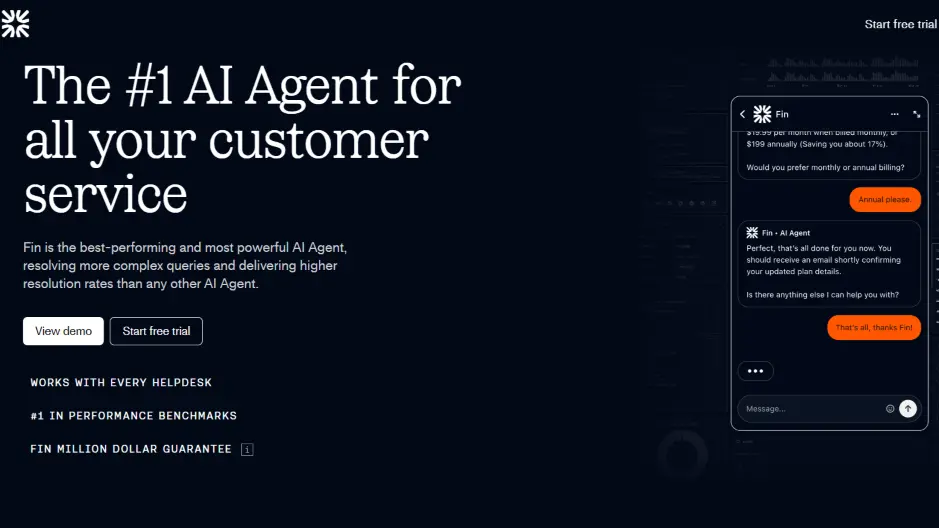
Intercom’s Fin AI Agent resolves authenticated tasks like order lookups, address updates, returns, and subscription edits using Tasks and Data Connectors. Shopify app exposes order status to Fin for instant answers.
Best for: Ecommerce brands already on Intercom that want resolution-based pricing.
Users: DTC and subscription commerce teams using Intercom Inbox & Messenger.
Top features: Data Connectors, MCP integrations (Shopify, Stripe, Linear), authenticated actions.
Pros: Clear pay-for-outcome model; rich ecosystem; strong Shopify coverage.
Cons: Best value if you standardize on the Intercom stack.
3. Gorgias AI Agent: E-commerce-native automation (Shopify-first)
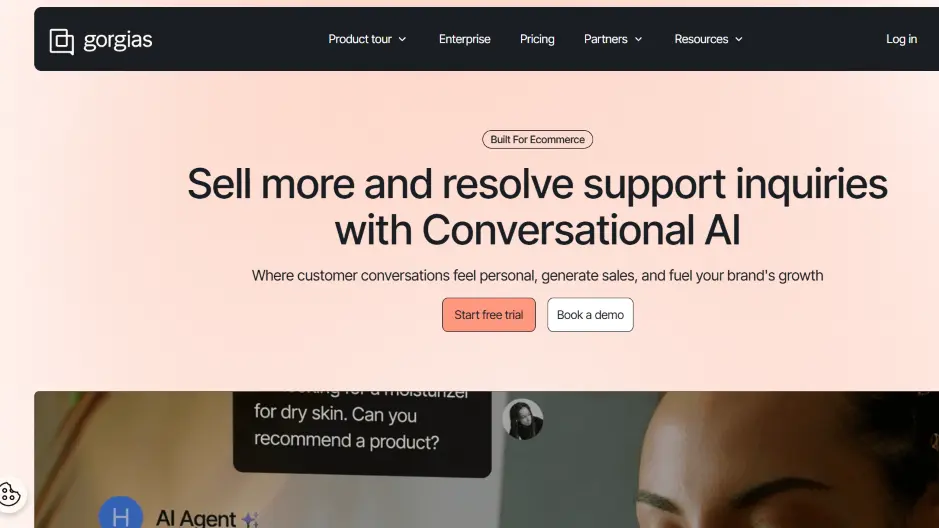
Gorgias pairs a Shopify-native helpdesk with an AI Agent that now auto-resolves Where Is My Order/Where Is My Return via AfterShip’s real-time data. Public pricing shows per-resolution rates.
Best for: Shopify/Shopify Plus stores wanting deep post-purchase automation.
Users: DTC brands, retail CX teams on Shopify.
Top features: AfterShip tracking & returns; catalog-aware selling; ticket+AI reporting.
Pros: Purpose-built for commerce, documented integrations, and transparent resolution pricing.
Cons: Ticket-based billing can add up at scale; strongest where Shopify is core.
4. Zowie: Automation-heavy retail CX with Reasoning + Decision Engine
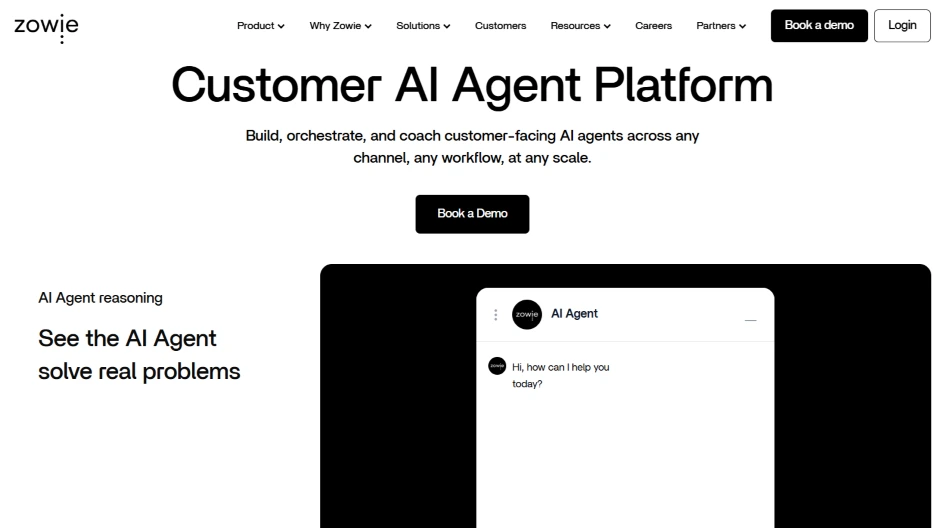
Zowie’s AI Agent uses a Reasoning Engine for intent understanding and a Decision Engine for end-to-end process execution (returns, refunds, account changes).
Best for: Fast-scaling DTC and marketplaces targeting high automation on web chat and social.
Users: Retail- D2C brands
Top features: Reasoning Engine; Decision Engine; omnichannel; analytics/coaching.
Pros: Strong automation rates in published stories; commerce playbooks.
Cons: Opaque pricing; implementation rigor needed for complex flows.
5. Ada: Enterprise AI agents with 50+ languages & Reasoning Engine
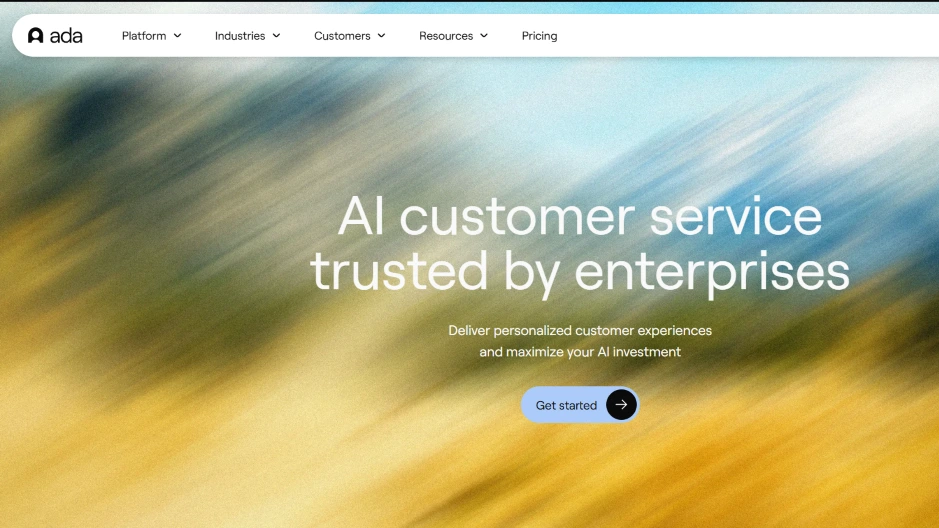
Ada focuses on autonomous resolution with a reasoning engine, multi-model routing, and 50+ language support across channels.
Best for: Global retailers seeking multilingual coverage and enterprise governance
Users: Large B2C apps and retailers; Salesforce AppExchange listing highlights retail service lift
Top features: Multilingual, integrations, reasoning-led planning, analytics
Pros: Language breadth; enterprise-grade controls
Cons: Learning curve; pricing not public
6. Zendesk AI: AI agents + copilot on Zendesk Suite
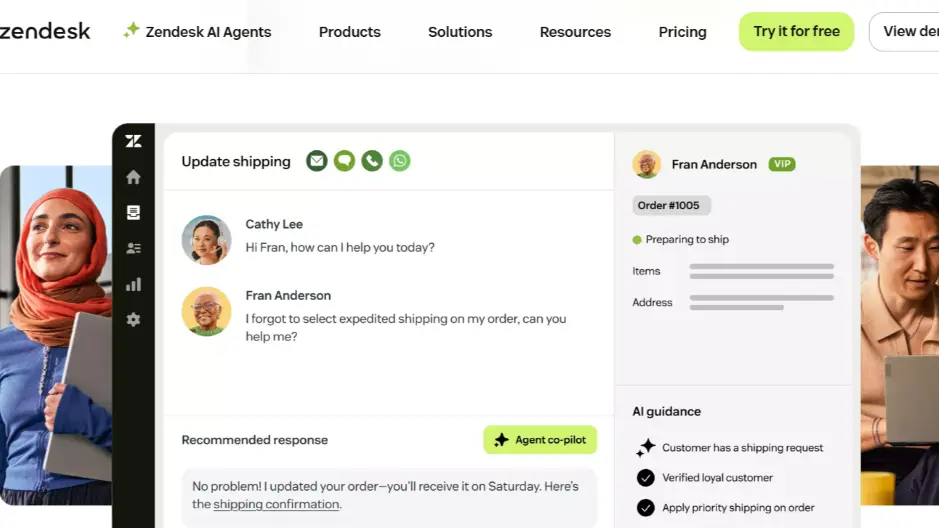
Zendesk ships AI agents and Copilot layered on Suite (ticketing, messaging, voice) with QA and workforce management add-ons popular with retail support teams.
Best for: Retailers already standardized on Zendesk seeking embedded AI
Users: Omnichannel CX teams using Zendesk Suite
Top features: Autonomous AI agents; copilot assistance; QA; WFM; omnichannel
Pros: Single-vendor stack; mature admin & reporting
Cons: Add-ons can increase the total cost of ownership depending on the tier
7. Freshdesk (Freddy AI): Balanced features/cost for growing DTC
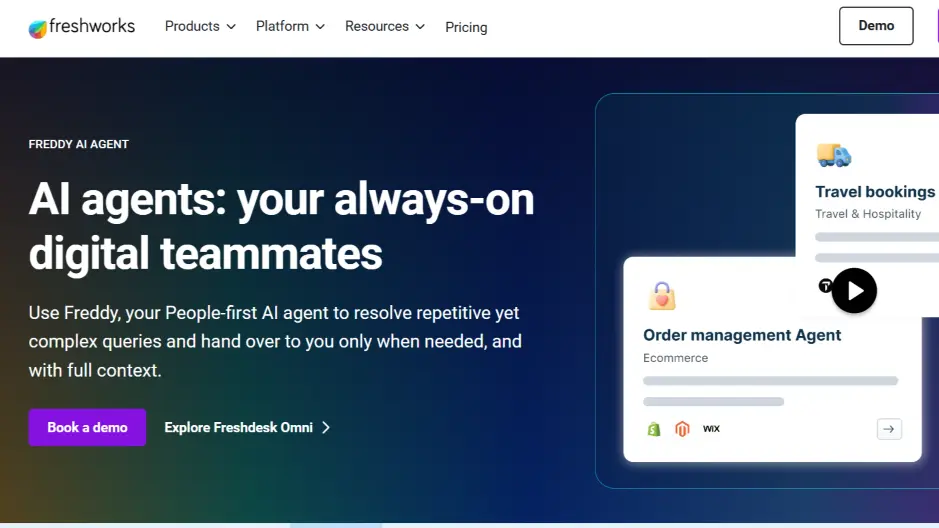
Freshdesk pairs ticketing with Freddy AI (copilot/assist) and documented Shopify integration for order/Refund actions from the helpdesk.
Best for: Shopify-connected brands needing value pricing and quick setup
Users: SMB/mid-market retail CX teams
Top features: Shopify context in tickets, Copilot drafting/summaries, app ecosystem
Pros: Lower entry cost; easy Shopify tie-in
Cons: Advanced autonomy requires configuration and add-ons
8. Kustomer AI Agents: Unified CRM with AI for customers & reps
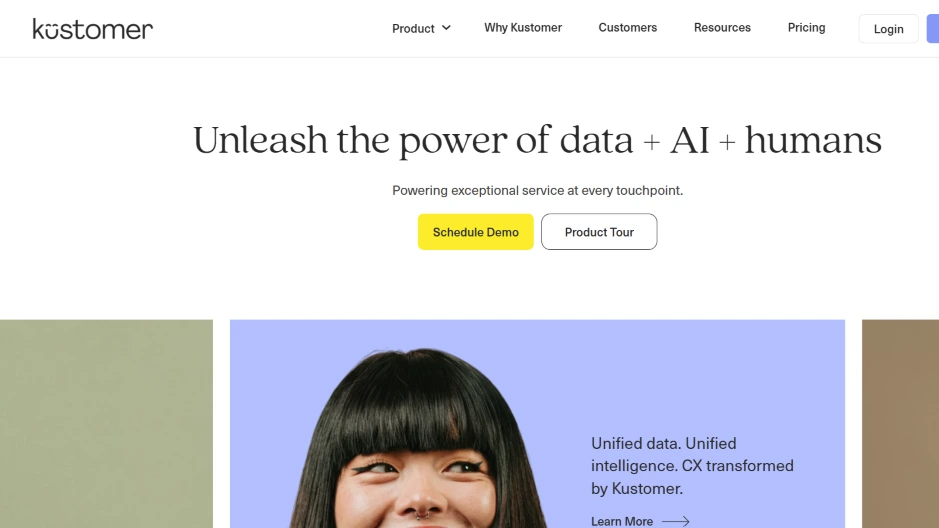
Kustomer offers AI Agents for Customers (automation) and AI Agents for Reps, with native voice and per-conversation pricing.
Best for: Brands that want CRM + AI in one platform (email, chat, SMS, WhatsApp, voice)
Users: Mid-market and enterprise retail CX
Top features: Omnichannel; rep assistance; native voice; skills-based routing
Pros: Clear AI pricing line item; CRM context in every action
Cons: Best results when you adopt Kustomer as the core CRM
9. LivePerson: Enterprise conversational commerce & service
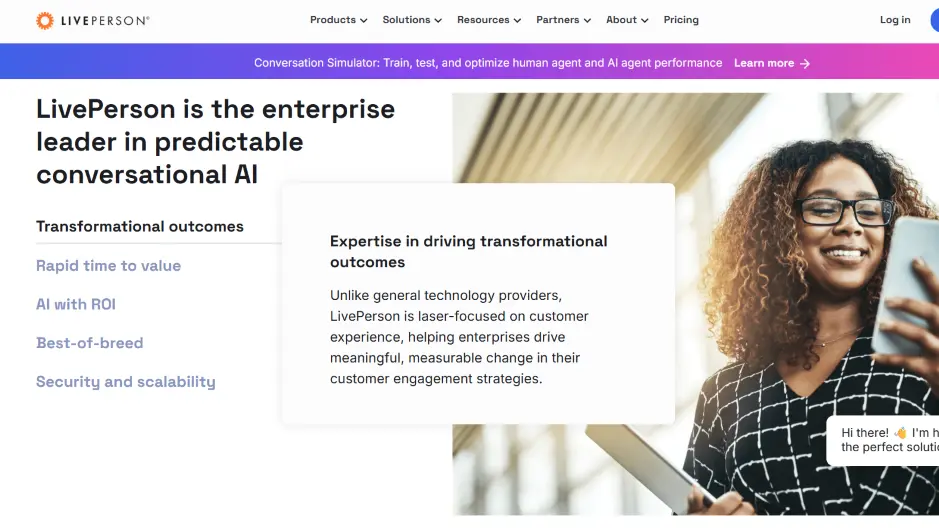
LivePerson’s Conversational Cloud powers voice & digital orchestration, focused on measurable outcomes in sales and service; retail is a core vertical.
Best for: Large retailers seeking automation-first programs across web, messaging, and voice
Users: Enterprise retail/telecom/FSI brands
Top features: AI orchestration; commerce journeys; nearly 1B monthly interactions dataset
Pros: Scale, industry programs, measurable savings claims
Cons: Enterprise-oriented buying and rollout
10. Cognigy: Enterprise chat & voice agents for ecommerce/retail
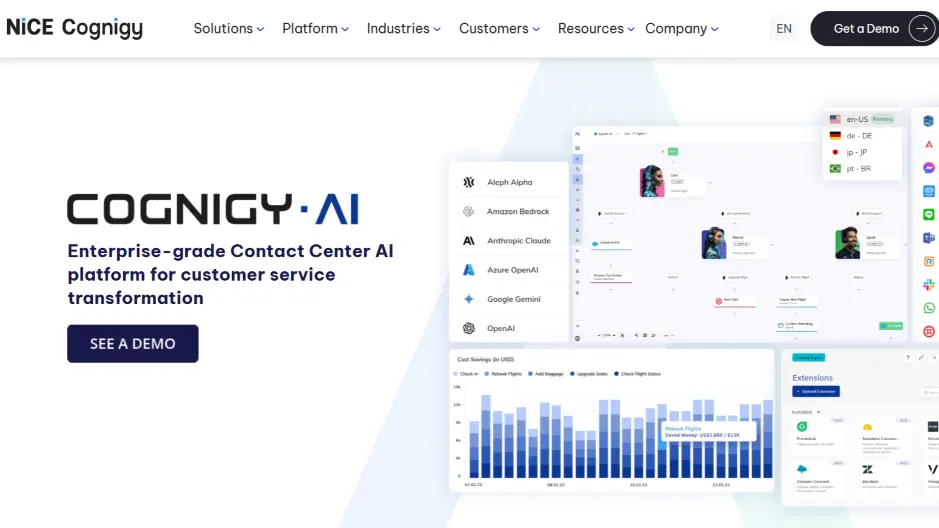
Cognigy provides agentic AI across chat and voice with 100+ language coverage and deep enterprise integrations for ecommerce and retail.
Best for: Retailers needing multi-lingual voice IVR and digital with strong governance
Users: Global retailers and service orgs
Top features: Voice + chat; tool integrations; performance focus; retail playbooks
Pros: Mature voice; internationalization; performance SLAs
Cons: Heavier enterprise implementation
11. Kore.ai (SmartAssist / RetailAssist): Contact-center-grade chat/voice
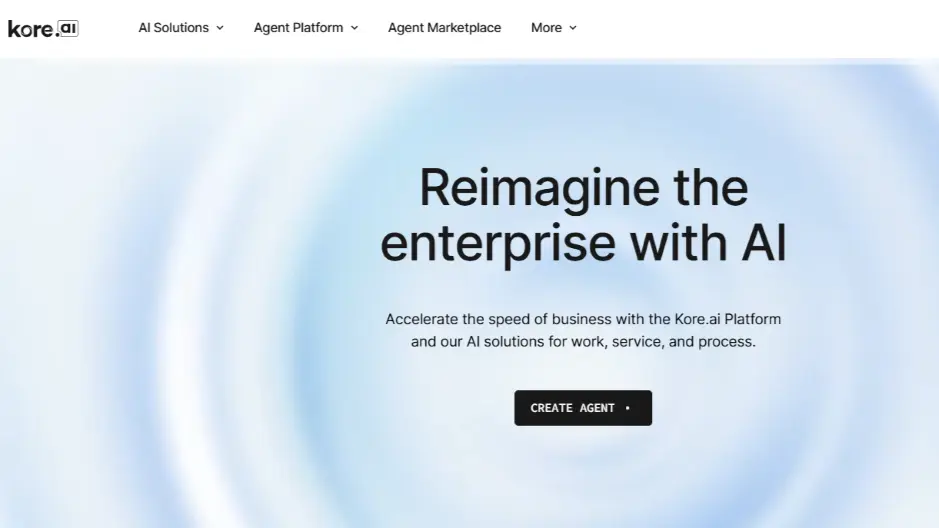
Kore.ai offers enterprise AI agents for service and process orchestration; RetailAssist has session-based SKUs (digital and voice) on AWS Marketplace.
Best for: Omnichannel retailers wanting prebuilt retail use cases plus custom orchestration
Users: Enterprise contact centers on NICE/Genesys/Salesforce
Top features: Multi-agent orchestration; 100+ tool components; on-prem or cloud
Pros: Strong governance; flexible deployment; marketplace pricing clarity
Cons: Setup complexity; best fit for larger teams
12. Salesforce Agentforce: Native skills across Service/Commerce Cloud
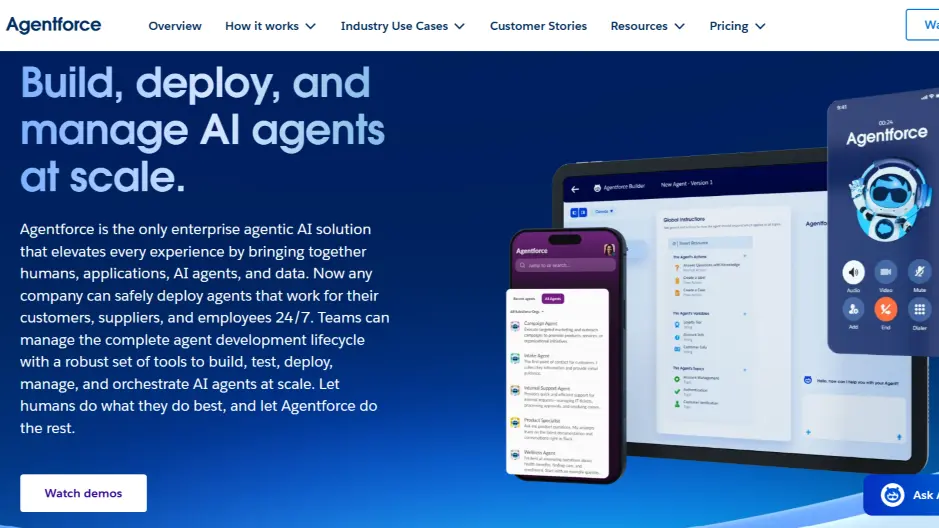
Agentforce lets you build autonomous agents for customer support, pricing/promo optimization, and shopping assistance, natively connected to Customer 360. A published rate card shows an add-on for employees.
Best for: Salesforce-standardized retailers wanting native agent skills and data access
Users: Enterprise retail, grocers, specialty chains
Top features: Agent templates for support and commerce; dynamic pricing/promo; OMS/loyalty context
Pros: Deep data access; admin/security fit for regulated enterprises
Cons: Best value when you’re already in Salesforce; ecosystem dependency
Retail Use Case (Actionable Picks)
The following scenario showcases real-world retail workflows, highlighting key use cases that can be optimized with AI agents. Each use case is paired with recommended tools tailored to specific retail needs.
Retailers can take advantage of various AI chatbot use cases to drive growth from lead generation to post-purchase support, and more.
1. WISMO & delivery change Queries
When it’s the right fit: When high volumes of post-purchase queries arise, AI agents handle order status checks and delivery reroutes, deflecting 90% of inquiries.
Options to consider: Robylon AI (Voice + chat), Gorgias AI Agent (+ AfterShip), PolyAI (voice)
Implementation notes
- Connect OMS and carrier data; expose actions for reschedule, address update, and confirmation messages.
- Require lightweight identity verification before any change.
KPIs to track: % WISMO deflection, median time-to-status, repeat-contact rate.
2. Returns automation
When it’s the right fit: Ideal for handling policy-driven processes, where customers need assistance with order tracking, returns, and exchanges. An AI-powered WISMO bot or order tracking chatbot can seamlessly take over initial inquiries and trigger the necessary steps like initiating return merchandise authorization (RMA), generating return labels, and processing exchanges.
Options to consider: Robylon AI, Ada, Gorgias AI Agent
Implementation notes
- Encode policies and eligibility; generate labels and update CRM/OMS objects in one flow.
- Offer “save the sale” options (size swap, store credit) before refund
KPIs to track: % automated returns, refund latency, exchange/save rate
3. Guided selling / conversational commerce
When it’s the right fit: Discovery and comparison use cases where AI shopping agents for retail can reduce choice overload and improve conversion.
Options to consider: Robylon AI (shopping assistant), Intercom Fin (chat-first), LivePerson (program scale)
Implementation notes
- Connect catalog, inventory, and promo rules; enable guided selling, AI prompts, and cart actions
- Explain “why this product” with transparent product recommendation engine logic
KPIs to track: Assisted conversion rate, AOV on agent-assisted sessions, browse-to-buy time
4. Voice-first CX (order tracking by phone)
When it’s the right fit: Urgent or high-friction issues where speaking is faster than typing; accessibility needs.
Options to consider: Robylon Voice AI, PolyAI
Implementation notes
- Point IVR WISMO intents to the voice agent; enable OTP/last-4 verification and OMS/carrier access for rescheduling
- Provide SMS/WhatsApp follow-ups with labels or links after the call
KPIs to track: Call containment, first-call resolution, and average handle time
AI voice platform revolutionizes customer interactions, providing seamless and personalized support across various channels.
5. Enterprise omnichannel program
When it’s the right fit: Multiple brands/regions, offline retail outlets, along with E-commerce options, and contact-center integrations
Options to consider: Cognigy, Kore.ai, Robylon AI (orchestration across chat + voice)
Implementation notes
- Persist context across channels (intent, order ID, last action, policy state)
- Define escalation paths and audit trails; align service level objectives by channel
KPIs to track: Cross-channel containment, policy-compliant actions, uptime at peak
Seamlessly connect with over 40 platforms to streamline your retail operations → Integrate with everything
Industry-Specific Considerations
In the retail industry, each vertical has unique needs that AI agents can address to enhance customer experience and operational efficiency. The following section highlights industry-specific use cases for AI agents and the key features that make them effective in each retail segment.
1. Fashion & Apparel
Prioritize personalization for retail and trend signals. Agents should combine browsing history, size/fit data, and seasonality to guide selections and manage exchanges. Connect catalog/OMS, pricing/promo rules, and loyalty for timely recommendations and smooth returns automation AI.
Discover how Robylon's AI agents transformed customer support for a D2C fashion brand by automating 85% of chat queries and 60% of tickets.
2. Grocery & CPG
Emphasize fresh inventory management and substitutions. Agents must read store-level stock, propose alternatives, and coordinate pickup or delivery windows.
Tie into warehouse management systems/order management systems/point-of-sale and carrier APIs; monitor shelf-life rules so recommendations stay compliant.
3. Electronics & Technology
Focus on product knowledge management and technical support. Agents need structured specs, compatibility matrices, and Return Merchandise Authorization (RMA) workflows to reduce escalations.
Connect KB, warranty systems, and omnichannel customer service for chat-to-voice handoff during complex diagnostics.
4. Multi-Brand Retail
Seek retail AI platforms that support multi-brand catalogs, role-based policy sets, and unified profiles.
Require shared analytics and guardrails so each brand’s tone, policies, and promotions stay distinct while data rolls up for leadership.
Conclusion
Selecting the best AI agents for retail is about reliable action across your data and channels, not feature checklists. Start with high-impact flows and choose from the tools that match your stack and governance
- Post-purchase service (WISMO, returns): Robylon, Gorgias AI Agent, Ada
- Guided selling / conversational commerce: Intercom Fin, LivePerson
- Voice-led journeys: Robylon Voice AI, PolyAI (voice adjunct)
- Enterprise orchestration / CCaaS-grade control: Cognigy, Kore.ai
- Helpdesk-centric suites: Robylon, Zendesk AI, Freshdesk (Freddy), Kustomer
- Salesforce-native programs: Salesforce Agentforce for Retail
Run a tight rollout, define on-policy actions, and benchmark containment, FCR, AHT, assisted conversion, and cost per automated resolution. Expand only where the data proves lift. Book a demo to know more.
FAQs
Which platforms should make our shortlist for - Best AI Agents in Retail in 2026?
12 retail-relevant options across chat, voice, and shopping assistance: Robylon AI, Intercom Fin, Gorgias AI Agent, Zowie, Ada, Zendesk AI, Freshdesk (Freddy AI), Kustomer AI Agents, LivePerson, Cognigy, Kore.ai (SmartAssist / RetailAssist), and Salesforce Agentforce for Retail. Use the feature notes and use-case “winners” in the article to match tools to your systems and channels.
Voice vs Chat: When should we use each for retail?
Use voice for urgent or complicated situations, delivery problems, address fixes, cancellations before fulfillment, where speed matters. Use chat for policy-heavy steps and anything needing links, forms, images, or labels (returns, warranty, product comparisons). Connect both with omnichannel customer service AI so identity, order IDs, and prior actions carry over.
How do we measure ROI for AI agents in retail?
Track a small, consistent set of metrics: containment rate, first-contact resolution, average handle time, assisted conversion rate (for shopping use cases), and cost per automated resolution. Compare these to your pre-launch baseline, then expand only where the numbers improve.
How are retail AI agents priced?
You’ll usually see one or more of these models: per message (chat), per minute (voice), per automated resolution, and platform subscription. Effective budgeting compares
- Cost per 1,000 chat messages
- Cost per 100 voice minutes
- Cost per automated resolution
Which use cases deliver results faster?
Start with high-volume, low-risk tasks: WISMO (“Where is my order”), returns and exchanges, and guided product discovery. These flows show quick gains in resolution time and cost per interaction. Add voice for urgent delivery issues and order changes where speaking is simply faster.
What is a retail AI agent, and how is it different from a chatbot?
A retail AI agent understands a shopper’s goal, looks up live order, inventory, and loyalty data, and completes actions like rescheduling delivery or issuing a return label. A basic chatbot mostly answers questions. Agents work across channels (chat, messaging, email, voice), follow your policies, and log every step so teams can audit outcomes.






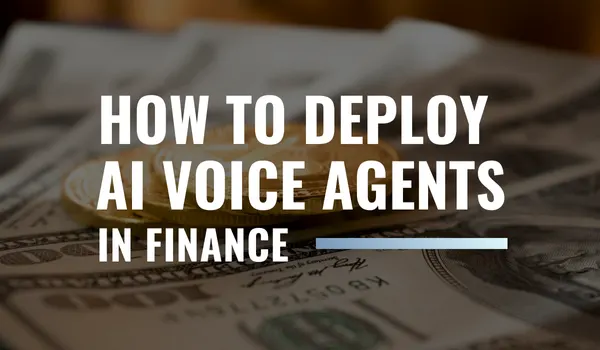
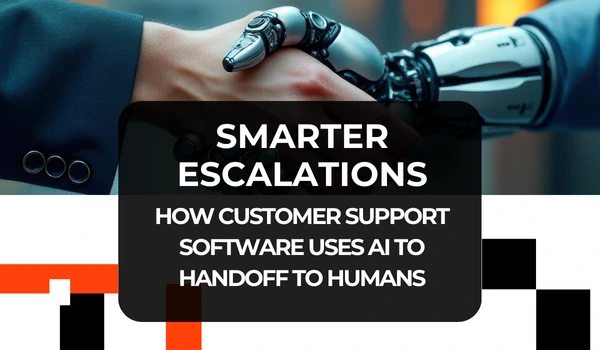
.png)
.webp)
